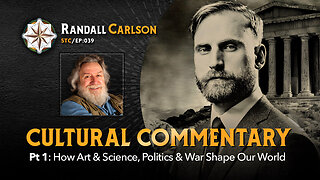Premium Only Content

Episode 2608: Synod of Synodality: Defending the Church Doctrine and Sacraments
Today’s episode is a blend of two seemingly unrelated but deeply connected topics: the renewal of the Church through Tradition and the need to break away from our broken healthcare system. What unites them? Both spiritual and physical well-being require commitment to what works the time-tested truths whether it's the Church’s sacraments or lifestyle changes that promote true health.
Today, we’re diving into one of the most pressing issues facing the Church today: the looming possibility of decentralizing Church authority and the ongoing Synod’s discussions about reforming canon law. These changes are not just procedural they touch the heart of what the Catholic Church is and how it serves Christ and His truth.
Pope Francis’s pontificate has been marked by tension with figures advocating for traditional doctrine, none more vocal than his longtime opponent from Argentina. This conflict offers us insight into two competing visions for the Church: one rooted in centuries of unchanging truth and another seeking to adapt to the world. We’ll explore recent developments from the Synod, reflect on Archbishop Héctor Gore’s recent letters exposing these errors, and discuss why we as Catholics must remain vigilant and faithful defenders of the Church.
The announcement that significant changes to canon law are coming by 2025 is a clear indicator that the Synod’s focus on “synodality” will have tangible effects. According to the Vatican's legal commission, these changes may include diocesan assemblies allowing non-ordained members men and women to share in decision-making with clergy. This shift raises concerns that essential Church functions are being democratized, undermining the spiritual authority entrusted to priests and bishops.
As St. Paul warned in 2 Timothy 4:3-4: “For the time will come when people will not tolerate sound doctrine but, following their own desires, will accumulate for themselves teachers to suit their own liking, and will turn away from listening to the truth and wander away to myths.” The decentralization of authority risks precisely this: fragmenting the faith by empowering regions and local groups to develop their own doctrinal interpretations.
The proposal to create regional councils with the authority to address Church doctrine echoes modernist trends of relativism an attempt to diminish the supreme authority of the Roman Pontiff. It raises the question: can Church unity survive when doctrine is subject to regional whims? As one Synod participant rightly noted, “A fragmented faith means a fragmented Church.”
Archbishop Gore’s letters call out this dangerous trajectory. He warns against the disdain for tradition now rampant within the hierarchy. Like many faithful Catholics, he views these developments not as reforms but as attempts to dilute the Church’s mission of proclaiming the truth. His message aligns with the words of St. Athanasius: “Even if Catholics faithful to Tradition are reduced to a handful, they are the true Church of Jesus Christ.” In the face of modern pressures, we must cling to the faith handed down through the ages.
Moreover, the changes to canon law are not merely academic. They will affect every Catholic involved in parish life, from liturgy to governance. We are seeing the redefinition of clerical celibacy, further erosion of traditional gender roles, and the weakening of episcopal authority. These changes threaten to make the Church indistinguishable from secular institutions, abandoning her role as the guardian of divine truth.
Archbishop Lefebvre’s evangelization efforts in Africa, rooted in the Traditional Latin Mass, stand in stark contrast to the decentralizing efforts we are witnessing today. His work reminds us that true evangelization brings the world to Christ, not Christ to the whims of the world.
Tradition vs. Synodality
The Synod is advocating for structures where non-ordained men and women participate in decision-making alongside clergy. This democratization attempts to diminish the role of Tradition, as though it were a relic we could discard. Archbishop Gore reminds us that you cannot understand the Church without Tradition. Tradition, rooted in the apostolic era, has always been the lifeblood of the Church, guiding her mission throughout history. “Hold fast to the traditions which you were taught, whether by word or our epistle,” St. Paul urges in 2 Thessalonians 2:15.
At the heart of these changes lies a dangerous modernist belief: that God changes His mind, or that doctrine must evolve to fit the times. But the mission of the Church has been constant since Pentecost to proclaim Christ to all nations and ensure that He is known and loved. Archbishop Gore writes:
"The mission of the Church is not a supplement to the history of ecclesial life, but constitutes the raison d'être of the Church."
The Church’s mission transcends eras, as it has from the time of the apostles. This continuity is expressed most profoundly through the priesthood, where young men continue to answer God’s call to serve, despite resistance and discouragement from modern forces. These priests embody five essential qualities that Archbishop Gore highlights:
• Burning faith and love of the Lord, the source of the Church’s life.
• Contemplative prayer before the tabernacle, affirming the centrality of the Eucharist.
• Untiring commitment to apostolic work, making the Church’s mission their own.
• Humility and patience, recognizing their limitations while relying on God’s grace.
• Joy springing from hope in Christ, even in difficult circumstances.
These virtues, Gore emphasizes, are non-negotiable for priests who continue the work of Christ. They reflect the Church’s unchanging mission to preach, serve, and sanctify, regardless of opposition.
The Danger of Religious Syncretism
Archbishop Gore warns us about the push for a “symbiosis of all religions,” a concept that echoes the relativism promoted by the United Nations' vision of pacifism. This interreligious blending seeks to dilute the Catholic faith, directly opposing Christ’s command: “Go, therefore, and make disciples of all nations” (Matthew 28:19). The Church’s identity must remain rooted in her unique mission to proclaim Christ as the one true Savior not as one option among many.
Marian devotion is also central to Catholic identity. Archbishop Gore reminds us of the significance of the approved Marian apparitions:
La Salette (1846): Mary wept over sins of blasphemy and the neglect of Sunday worship, reminding us that the world’s rejection of God is nothing new.
Lourdes (1858): Mary revealed herself as the Immaculate Conception to St. Bernadette, affirming the Church’s teaching on her purity and intercession.
Fatima (1917): Mary’s warnings about repentance and conversion remain just as urgent today, as the Church navigates confusion and error.
These Marian apparitions reflect God’s mercy, calling the faithful to return to Him amid widespread apostasy. They also demonstrate that the Blessed Virgin plays a unique role in guiding the Church, especially in times of crisis.
The Resilience of Tradition
Despite opposition, Archbishop Gore notes that many young people are embracing the great traditions of the Church, especially the Traditional Latin Mass. In regions where bishops have preserved the faith, Tradition flourishes with clear spiritual fruits. This demonstrates that authentic renewal in the Church comes not from novelty or compromise, but from fidelity to Christ’s teachings and the sacraments.
Sadly, many priests faithful to Tradition face persecution, hindered in their ministry by the very leaders who should support them. Yet, “Blessed are those who are persecuted for righteousness’ sake, for theirs is the kingdom of heaven” (Matthew 5:10). Archbishop Gore reminds us that these priests, despite opposition, are doing the work of Christ. They embody the continuity of the apostolic ministry and bear witness to the unchanging truth of the Gospel.
Call to Action: Stand Firm in the Faith
The push to decentralize authority, create new synodal structures, and blend religions is a direct challenge to the Church’s mission. As Catholics, we must resist these changes with courage and conviction. The unity of the Church, guaranteed by the authority of the Pope and grounded in Tradition, cannot be compromised.
St. Pius X once said: “The true friends of the people are neither revolutionaries nor innovators, but traditionalists.” We must be those true friends defending the faith with love and fidelity, even when it’s unpopular.
Prayer, fasting, and witnessing to the truth are essential in this battle. As St. Paul exhorted: “Fight the good fight of faith; take hold of the eternal life to which you were called” (1 Timothy 6:12).
As we reflect on Archbishop Héctor Gore’s insights about the 90th anniversary of the Eucharistic Congress in Buenos Aires, we’ll also confront how today’s healthcare system what many are calling "sick care" fails to promote genuine health. Just like the Church must return to her roots to thrive, we need to rethink how we care for our bodies and souls.
Renewal Requires Faithfulness, Not Innovation
Archbishop Gore emphasizes that renewal in the Church won’t come from endless reforms or synodal experiments but from embracing the timeless traditions that have always sustained the Church. As he said:
"If you want true renewal in the Church, embrace the traditions that have always defined it."
He points us to the 23rd International Eucharistic Congress of 1934, where Cardinal Eugenio Pacelli (the future Pope Pius XII) marveled at the sight of countless children receiving their First Communion, proclaiming, “This is heaven!” The Congress was a beacon of faith amid a rising tide of secularism in Argentina. Confessionals overflowed, and many people returned to the sacraments after years of neglect.
But, as Archbishop Gore reminds us, without strong leadership, even the most vibrant movements can lose momentum. He laments the lack of courageous bishops willing to engage in the cultural battle for souls. This failure allowed secularism to creep back into society a warning for us today as we face similar spiritual challenges. Just as the faith cannot flourish without Tradition, our physical well-being cannot thrive without addressing the root causes of disease.
The Problem with Sick Care, Not Healthcare
Just as the Church is struggling with misguided innovations, the modern healthcare system focuses on treating symptoms rather than preventing illness. Much like a parish that abandons Tradition for modern trends, healthcare today has lost sight of its primary mission: helping people stay well.
Many of us are tired of this system. Doctors prescribe medications instead of addressing root causes:
Why prescribe stool softeners instead of recommending magnesium, which supports digestion naturally?
Why not tell patients to take Vitamin D3 during winter, when sunlight is scarce and immune systems weaken?
Why not educate people on foods like grapefruit, which can naturally support blood pressure?
Why isn’t emotional health part of routine care, when stress and anxiety have such a profound impact on physical well-being?
The truth is, 90% of disease stems from lifestyle choices. And yet, the healthcare system rarely addresses diet, sleep, herbs, or mindfulness. Doctors often wait until something is broken instead of helping people avoid illness in the first place just like a Church waiting for her people to fall away rather than forming them in the faith.
Prevention: A Spiritual and Physical Mandate
Archbishop Gore’s reflection on Argentina’s faith crisis mirrors the same reactive mindset in healthcare today. Doctors and bishops alike should be at the top of the hill, warning people about dangers ahead, instead of waiting at the bottom with ambulances to clean up the damage. Yet, healthcare today only engages when patients are sick. If you pass your physicals, you’re sent home with instructions to return next year. Sound familiar? Many parishes treat souls the same way offering little spiritual nourishment until a crisis arises. This reactive approach whether in medicine or ministry is simply unsustainable.
Just as the Archbishop calls for a return to the sacraments, we need a similar return to true health practices. We don’t need complex systems or expensive treatments God has already provided the tools we need to be healthy in body and soul. You don’t need a prescription to improve your health; simple steps like changing your diet, balancing hormones, and practicing gratitude can transform your life.
Breaking Free from Marketing Myths: A Lesson from Breakfast
The problems run deeper than just healthcare they’re woven into our culture. Take the idea that breakfast is the most important meal of the day. This belief didn’t come from doctors or health experts but from advertising campaigns in the 1920s and 30s designed to sell bacon and eggs. They even recruited 5,000 doctors to endorse this “study” and convince people it was science. The result? A cultural myth that persists to this day.
Much like these misleading marketing efforts, modern medicine has become overly commercialized. We’re sold medications instead of real solutions, much like how the faithful are sometimes given spiritual platitudes instead of the sacraments that nourish the soul. The truth matters whether it’s about food, health, or the faith and we must reject the myths that keep us in bondage.
The Solution: Be the Doctor in Your Own Life
Just as the Holy Spirit calls us to renewal by following the path of Tradition, we must take responsibility for our health by following time-tested practices. The greatest doctor is already inside of you. Your body was created by God with the capacity to heal itself if given the right care. But we need better information.
One doctor, Dr. Living Good, offers a solution with his book and 21-Day Wellness Formula. He emphasizes that health begins with lifestyle changes, not endless prescriptions. As he says:
"We want to be at the top of the hill, warning people not to ski down the double black diamond slope, instead of waiting at the bottom with an ambulance to pick them up after they crash."
This mindset shift is essential both for our health and our spiritual lives. We must stop reacting to crises and start building strong foundations, whether that means committing to daily prayer and the sacraments or balancing our diets and managing stress.
A Call to Action: Return to What Works
The Archbishop’s reflection on the Eucharistic Congress teaches us that real renewal comes from faithfulness to what has always worked. The Church doesn’t need new doctrines just as we don’t need new diets or miracle cures. What we need is a return to the essentials:
Daily prayer and the sacraments for our souls.
Proper nutrition, sleep, and exercise for our bodies.
Strong leadership from bishops and doctors alike who are willing to stand against cultural trends and fight for the truth.
The Eucharist remains the heart of the Church, just as good lifestyle choices are the foundation of true health. Wherever Tradition is cherished, faith flourishes. Wherever people take responsibility for their health, healing happens.
Conclusion: It’s Time for Renewal
Renewal whether in the Church or in our health begins with us. The Holy Spirit is calling us to reclaim what was lost, to build on the foundations laid by those who came before us. It’s time to stop waiting for someone else to fix things. We are the solution.
If this message resonates with you, take the first step today whether by returning to Mass, going to Confession, or making small changes to your diet and lifestyle. As St. Paul reminds us:
"Do you not know that your body is a temple of the Holy Spirit? Glorify God in your body" (1 Corinthians 6:19-20).
Thank you for joining us today! Go make it a great day you’re not going to get it back.
Closing Prayer:
"Heavenly Father, we thank You for the gift of life and the wisdom of Your Church. Strengthen us to care for our bodies and souls, and guide us along the path of truth. Through the intercession of the Blessed Virgin Mary and all the saints, may we live fully in Your grace. We ask this through Christ our Lord. Amen."
-
 1:19:23
1:19:23
Josh Pate's College Football Show
10 hours ago $4.30 earnedBig Ten Program Rankings | What Is College Football? | Clemson Rage| Stadiums I Haven’t Experienced
63.2K1 -
 LIVE
LIVE
Vigilant News Network
15 hours agoBombshell Study Reveals Where the COVID Vaccine Deaths Are Hiding | Media Blackout
1,944 watching -
 1:17:59
1:17:59
Sarah Westall
11 hours agoDOGE: Crime & Hysteria bringing the Critics & the Fearful - Plus new CDC/Ukraine Crime w/ Dr Fleming
65K5 -
 45:39
45:39
Survive History
17 hours ago $9.79 earnedCould You Survive in the Shield Wall at the Battle of Hastings?
69.8K6 -
 1:50:28
1:50:28
TheDozenPodcast
15 hours agoViolence, Abuse, Jail, Reform: Michael Maisey
105K4 -
 23:01
23:01
Mrgunsngear
1 day ago $6.25 earnedWolfpack Armory AW15 MK5 AR-15 Review 🇺🇸
90.3K12 -
 25:59
25:59
TampaAerialMedia
1 day ago $4.01 earnedUpdate ANNA MARIA ISLAND 2025
57.7K4 -
 59:31
59:31
Squaring The Circle, A Randall Carlson Podcast
17 hours ago#039: How Politics & War, Art & Science Shape Our World; A Cultural Commentary From Randall Carlson
44K3 -
 13:21
13:21
Misha Petrov
17 hours agoThe CRINGIEST Thing I Have Ever Seen…
35.9K63 -
 11:45
11:45
BIG NEM
13 hours agoWe Blind Taste Tested the Best Jollof in Toronto 🇳🇬🇬🇭
25.7K1